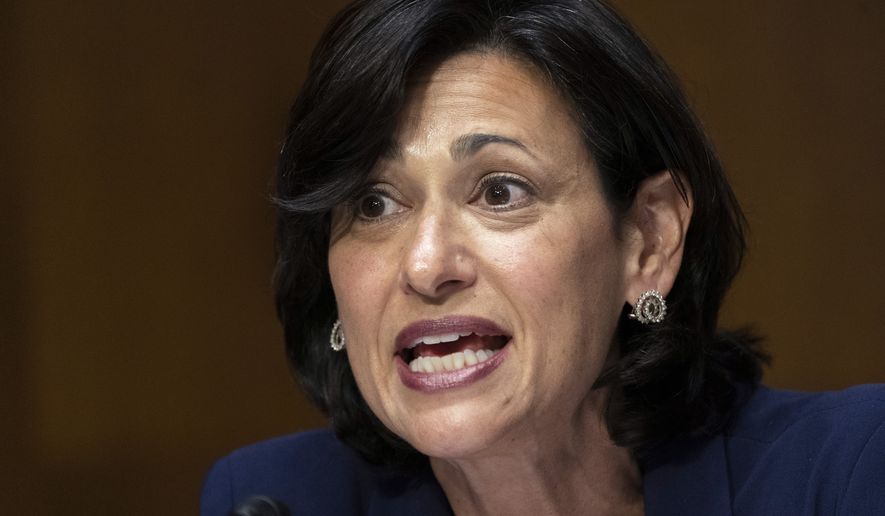The White House will ramp up monkeypox testing and exponentially expand the reach of vaccines to at-risk contacts in the first phase of President Biden’s plan to respond to a virus that’s been pinging around the U.S. for over a month.
The administration said it will allocate 296,000 doses of vaccine in the coming weeks, including 56,000 immediately.
It is a major escalation from the vaccine campaign that previously distributed 9,000 doses of stockpiled vaccines. The campaign will emphasize the Jynneos vaccine that is designed to combat smallpox and monkeypox.
The Jynneos shots are in limited supply, so doses will be sent to areas with the highest transmission while the administration supplements the effort with the ACAM2000 vaccine for smallpox, a related virus.
Over the coming months, 1.6 million doses will become available nationwide as the administration digs in for a lengthy effort.
Many of the cases have been linked to men who have sex with men, though some persons do not know how they got the virus, meaning there could be some community transmission.
The Biden administration said it will support the LGBT community with testing and vaccines and maintain lines of communication to combat stigma and bias since anyone can catch monkeypox through close contact.
Monkeypox cases started to appear in the U.S. and other non-endemic countries in mid-spring.
Infections have continued to mount since the first case was detected in Massachusetts, reaching over 300 in nearly 30 states or jurisdictions, according to the Centers for Disease Control and Prevention.
The administration outlined its plans amid concern the monkeypox virus could spread undetected and become a full-blown health crisis. Scientists say public officials were too slow to detect and track the coronavirus after its discovery in China, so the administration is under pressure to keep the new health threat in check.
The White House said people should not panic because monkeypox is not new.
“This is not a novel virus. Unlike COVID of two years ago, monkeypox is a virus that’s been around forever,” said White House COVID-19 Coordinator Ashish Jha, who is assisting on the monkeypox front. “We have had no deaths so far.”
At the same time, he said there are still unknowns about the outbreak and they don’t want to take any chances.
The administration said it scaled up testing capacity at 78 sites in 48 states, primarily at state public health laboratories, and can process 10,000 tests per week. It also started shipping its FDA-cleared orthopox test to five major commercial laboratory companies.
“These laboratories will begin to come on board for testing in early July and increase capacity through the month,” the White House said in a fact sheet.
Part of Europe and other countries have reported a surge in cases alongside the U.S., raising alarm while sparking new sympathy for parts of Africa that have struggled with the disease for years.
The recent outbreaks have produced 4,700 known cases in 49 countries, CDC Director Rochelle Walensky said.
Transmission of monkeypox typically occurs through close personal contact, particularly when fluids or contact with blisters is involved. It can spread through respiratory droplets but that typically requires close, sustained face-to-face contact.
The virus does not appear to linger in the air, meaning casual conversation or shopping in the same store should be safe. The virus does not appear to spread through touching common items, like doorknobs.
Administration officials said there is evidence that close contact and sexual contact have been the primary drivers of the current outbreak.
Monkeypox is marked by fevers and an obvious rash. Cases are typically found in West and Central Africa and result in humans from contact with rodents.
The strain that is circulating now is related to a milder west African strain that is typically not deadly.
The Jynneos vaccine is given in two doses, 28 days apart, and maximum protection comes two weeks after the second dose. It’s also best to get vaccinated quickly to stave off infection or disease.
“The sooner you can get vaccinated after the exposure, the better,” Dr. Walensky said.
The vaccines will be given to people with presumed or confirmed exposures to monkeypox, including persons who had close physical contact with someone diagnosed with monkeypox.
They will also be given to those who know their sexual partner was diagnosed with monkeypox, and to any men who have sex with men who recently had multiple sex partners in a venue where there was known to be monkeypox.
“This phase of the strategy aims to rapidly deploy vaccines in the most affected communities and mitigate the spread of the disease,” a White House fact sheet said.
States will be given an equitable allotment based on cases and the proportion of the population at risk for severe disease from the virus.
The administration’s response is being coordinated by the National Security Council Directorate on Global Health Security and Biodefense, a pandemic-related office that Mr. Biden restored upon taking office.
Earlier Tuesday, the CDC said it activated its Emergency Operation Centers to deal with monkeypox. The center is home to 300 CDC staff who will collaborate with local, national, and international partners.
• Tom Howell Jr. can be reached at thowell@washingtontimes.com.




Please read our comment policy before commenting.